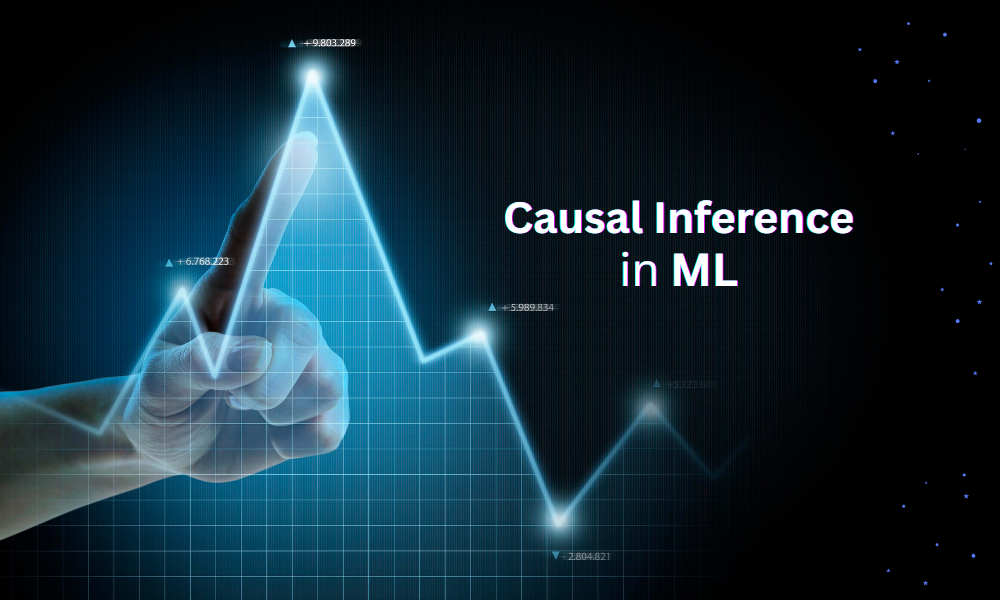AI and machine learning are utilized across a wide range of industries today, providing high-impact benefits in the digital landscape. Machine learning is indeed about predictions about possible outcomes. But in the scenario where we want to know why this happened? A topic of discussion, right?
Well! This is where causal inference comes to light. It differs from typical machine learning models, which focus on identifying patterns and associations in data. Alternatively, causal inference focuses on the causes and effects of relationships.
- Did the marketing campaign drive success in the company’s sales?
- Will price change influence customer churn?
And likewise.
Here in this blog, let’s run down and understand all about causal inference in ML along with its real-world examples and more.
Let’s get started!
What Exactly is Causal Inference in Machine Learning?
Causal inference in machine learning involves identifying and estimating causal relationships in data. We are always eager to know the cause of a particular event, and casual inference can be helpful in this case. Now, when it comes to data, causal inference provides AI and ML models to think about the mechanisms producing the data, giving answers to questions such as:
- How would the sales have increased if we had run an offer?
- What would be the effect of turning on automation in our email marketing campaign?
Thus, it’s clear that traditional ML models are great at predictions, but correlation does not mean causation. Take the example of frozen milk; when kept outside, it will thaw. Here, correlation does not mean one causes the other, but rather that it depends on the temperature outside.
Importance of Causal Inference in Machine Learning for Businesses
Businesses need to go one step further to understand why the results occur. Check out the importance here:
Optimizing Marketing Campaigns
Causal inference greatly helps in optimizing marketing campaigns. It allows you to measure the impact of campaigns on conversion rates. It separates the effect of a campaign from seasonal or environmental changes. Considering the information, businesses can make well-informed decisions and allocate their marketing budget accordingly.
Boost Customer Personalization
By getting a clear idea of why users interact with a product or feature, businesses can personalize their offerings. This will be a win-win for both the customers and businesses.
Get Maximum Operational Efficiency
In the operations field, causal inference can be used to find specific factors that drive efficiency. In operations, causal inference can be used to identify the specific factors that drive efficiency. For example, how automation or change in the manufacturing process is affecting the quality or business outcomes.
Fraud Detection
Fraud is increasing at the fastest pace today. Identifying the clear cause of fraud can help companies mitigate risks and take preventive measures accordingly.
Sharing the Real-World Example of Causal Inference in ML
Say the internet provider is consistently coming up with customer complaints. Frequent issues such as call dropping, outage in network and so on. The other scenario is that the town also installed 5G networks on the same day. Now we can think that the new tower impacts the network.
Here in this scenario, causal inference can help. Engineers can identify the relation between the time of tower activation and the time of the outage. Causal Inference allows engineers to also control confounders and other relationships, to determine whether there is, in fact, a causal relation. This will enable engineers to target the issue effectively when they identify a causal relationship, without the influence of biased judgment.
What are the Methos of Causal Inference?
Following are some of the causal ML methods:
Randomized Controlled Trials (RCTs): This is the standard method for establishing causal inference; however, it is not apt in all scenarios.
Propensity Score Matching: This type of method maintains a balance between treatment and control groups with the help of data observed.
Instrumental Variables: This method is used to address unobserved confounding.
Causal Graphs (Directed Acyclic Graphs): These provide a visual means to define the causal relationships among variables and establish whether one variable cause another.
Do-Calculus and structural causal models (SCMs): An advanced method that provides causal inference from complex form of data where finding causal relationships is difficult.
Applications of Causal Inferences in ML
Here are examples of areas where causal inference in the context of machine learning is used in applications.
Healthcare: Determining the effect of interventions on some measures of patient care.
Finance: Knowing the causal factors of loan defaults and the risk associated with risks.
E-commerce: In this case, what will be the impact of discounts or offers on the customer purchase rate.
Policy Making: Evaluating the causal effect of public policies on employment or health metrics.
Wrapping it Up!
Causal inference in machine learning is one of the most powerful advancements in ML, enabling data scientists and companies to look beyond predictions into why events occur. As companies seek actionable insights from data, causal inference will become an invaluable capability for achieving competitive advantage in an increasingly AI-adopted world.
Stay tuned with all the top blogs around the tech landscape right here with us at KnowledgeNile!
You Might Like: AI And ML In Human Resources: How Are They Affecting The Field





